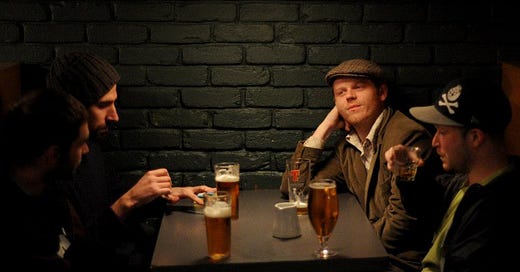I never set out to become a posterchild for poverty. But somewhere along the way, I became a recognisable face — an emblem, even — of trauma and social deprivation. My background, my past mistakes, my recovery and survival were absorbed into a kind of shorthand: here is someone who has been through it. Someone who speaks with “lived experience.” Someone who brings authenticity.
There was power in that, at first. I was being invited into spaces I’d once been excluded from. I had a platform, a voice. But becoming a public face of trauma isn’t the same as being seen. What people often wanted was the story of suffering — sharp, dramatic, preferably redemptive. There was far less interest in the parts that followed: the quiet, complicated work of building a life, of trying not to be defined by the worst thing that ever happened to me. The nuanced, non-linear reality of periods of recovery followed by slips and setbacks - there never seems to be as much interest in hearing about any of that.
It became clear that what drew attention was the spectacle of hardship, told with emotional precision. The press liked the arc: from poor and chaotic to articulate and functional. But only just — the edge still had to be visible. Too stable, too critical, too self-possessed, and you risked losing your place in the trauma economy. The role I was cast in was flattering, in some ways, but it was also a trap. You don’t own the story anymore — the story owns you.
And once you're positioned as a representative — of poverty, addiction, trauma, class — there’s pressure to keep performing that identity. The problem is, I don’t represent anyone but myself. My experience can speak to certain realities, but it’s not a stand-in for everyone who grew up skint, or everyone who’s had to survive systems that punish vulnerability. Still, the institutions and platforms that celebrate lived experience often want simplicity. They want a face. A hook. A headline. While this is understandable, it is not without risks.
I often felt I had to keep mining my past because it had currency. My adversity was useful. It made people feel things. Gave them a sense that they were more informed. But the more I gave, the more I began to feel exposed — like I was handing over pieces of myself to be packaged and sold. Trauma had become not just something I had survived, but something I was expected to continually relive. On rare occasions when I pushed back against this expectation, the fact I’d voluntarily told my story publicly was used against me. Like I was trying to have it both ways. Apparently, you don’t get to pick and choose when to discuss private details of your own life - once your story is public, it’s not your property anymore. It stopped feeling like testimony and started feeling like performance.
I’m not ungrateful for the chances I’ve had. I know the importance of making space for voices like mine. But I’ve learned to ask: who is benefiting from this story being told, and on whose terms? How much autonomy do I have over how I am presented? And is this story a reflection of who I really am or a reflection of how I wish to be seen by others? There’s a difference between using your voice and being used. Between sharing and being stripped bare. Sometimes, it’s not the ambulance chasers we need to be vigilant about: operating from woundedness, we often exploit ourselves in the endless search for safety and affection.
If any of this message interests you, I hope you’ll consider supporting my forthcoming book by preordering or maybe catch one of the companion live shows at this year’s Edinburgh Fringe. It’s a tough time for everyone just now and I recognise that’s a lot to ask. Whatever you choose to do, thanks for reading x


